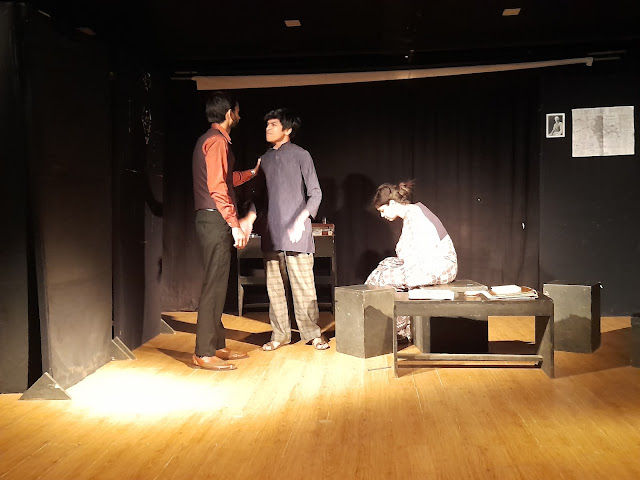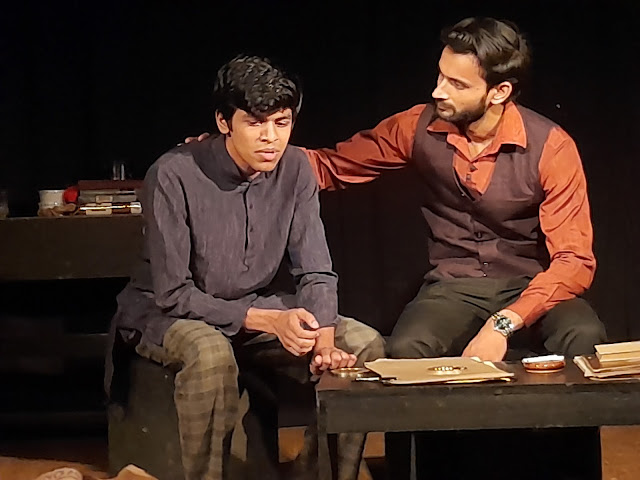The Litmus test of a just murder
( हिंदी में समीक्षा के लिए - यहाँ क्लिक करके क्रम सं. 21 देखिए )
Committing a murder is not merely a body-act but also a much much deeper psychological act. A murderer first kills his own humanity before killing someone else. Alas! He has to do it knowingly when he happens to be a part of a violent revolutionary group. See, a revolutionary group is also made up of human beings and not of robots or machines. They too have minds and hearts. Even while nurturing the strongest commitment for the broader benefit of human community the despicable means he adopts make him shivering too.
The British Rule in India was based on tyranny and injustice and murder of a British Governor is planned by the revolutionary party.
"Killing is a sin" is known to every member but all of them develop different self-defense mechanism for conserving his/her moral plinth. A jail-returned member is so battered by his past experiences with the administration that he has turned into a murder maniac like a wild animal. His only ambition is to wreck havoc through his dastardly acts for the sake of revolution. Once he asks the bomb-maker woman as how many bombs will it take to blow off the whole city. There is also a humane member who decides to abstain completely from a direct involvement in murderous act and choses a more sober path like joining it's propaganda wing. The same is the mental state of the female revolutionary who is expert in bomb-making. Her consolation is that even though her bombs kill humans but she does not have to kill them directly. Whenever she is with her lover member she talks about her past peaceful life full of love and harmony. There is a Captain-like character who somehow keeps every member enthused about the mission of the revolution and provides logistic as well as philosophical support for committing murder.
One thing is clear that they all are brave and honest in their purpose. They do not have any self-seeking interest in their cause. They all are ready to sacrifice their life and all the pleasures of it just for the sake of crores of their compatriots. They too have desires for happy, peaceful and loving life but they sacrifice their desires for ensuring love, peace and prosperity of their countrymen. Even the member who has abstained from participating in direct killing and joined the propaganda wing and that woman who also only makes bombs and never throws it know well that the danger is the same as that of a killer. Since if caught, they all will be hanged by the government. But it is their moral dilemma that keeps them away from becoming a direct murderer.
Even the member who chooses his role of throwing bomb on the Governor fails to do so once only because he sees two innocent kids sitting in the vehicle with the Governor. For killing the Governor he cannot kill the innocent kids also. It is only in the second attempt when he kills the Governor ensuring well that his wife or kids are not killed.
The dilemma deepens further after the Governor is killed and the killer is jailed. There is feelings of both win and loss in the heart of the killer. He has won in his Cause but has lost on humanity. In the jail, three characters namely Co-prisoner, Police Chief and Governor's wife meet him. The wife of the killed Governor elaborates the details of the humane side of Governor's killing and the killer is deeply repentant learning that he has killed a person who also possessed a kind heart internally. After her, the Police Chief tries to convince him that he should accept that he has repentance for murder and he believes that it is not going to help his revolutionary cause. If he does so his life would be saved. But the killer prefers himself to be hanged for two reasons - One he wants to do penance for his humane sin and secondly for saving himself from the another sin of betraying his revolution. After his execution, his lover woman (the bomb-maker) continues the revolution further so that she should also be executed like her lover.
This play directed by Saumya Tewari was the Hindi adaptation of the French play "The Just Assasins" by Albert Camus. Actors were Adarsh Chaudhary, Saurabh Jha, Ashish Sharma, Saumya Tewari, Arpit Sipani, Aabi Deswal, Mansi Sharma and Manish Yadav. Music input was from Saurabh Ranakoti and on Lights was Karan Singh Gahlot.
Hindi adaptation by Suresh Bhardwaj and Deepa Sahi is so natural that it tastes like an original Hindi play. Saumya Tewari's direction was fine in the way that she has taken good output from somewhat new actors. Her dialogue-delivery lets the audience enter a deep contrast of love and revolution. The jail-returned member cast good effect as an angry man. His body-movements and force in dialogue-delivery were perfect. The Captain looked cool, composed and yet commanding as desired. The Killer was successful in bringing out the infighting of his heart to the viewers. The Governor's wife, The Co-prisoner (and also the hang-man), and Police Chief did their work well on the stage. Some of the actors kept their eyes closed while delivering the dialogues. This can be justified for soliloquies but not for all dialogues. The director may look on it.
























No comments:
Post a Comment
Now, anyone can comment here having google account. // Please enter your profile name on blogger.com so that your name can be shown automatically with your comment. Otherwise you should write email ID also with your comment for identification.